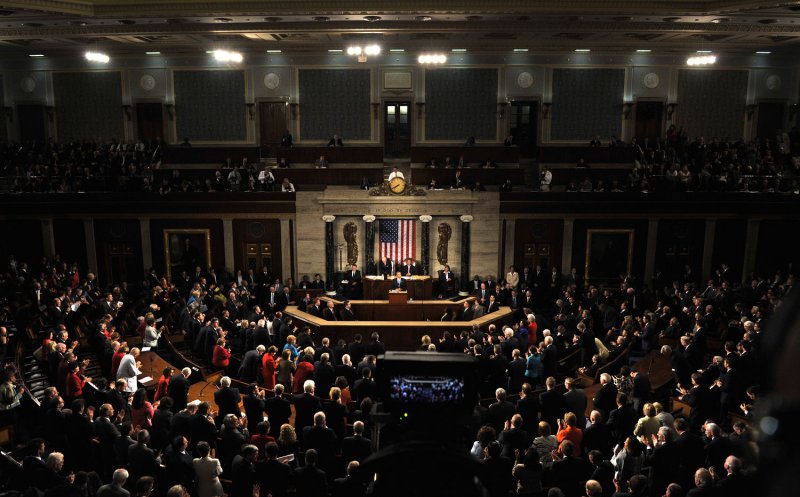U.S. President Barack Obama outlines his job creation plan before a Joint Session of Congress in the U.S. Capitol Building in Washington, DC, on September 8, 2011. UPI/Roger L. Wollenberg |
License Photo
U.S. President Barack Obama tried to rev up the economy by exhorting Congress to immediately pass the American Jobs Act he plans to send over this week, saying his formula of tax cuts, credits and relief is what the country needs now.
The country needs something. Unemployment has stood at 9.1 percent for two months running. In the latest report, first-time jobless claims rose by 2,000 to 414,000 for the week ended Sept. 3. The gross domestic product grew by only 1 percent in the second quarter. And the stock market seems to be heading south again.
Not a pretty picture.
After Obama's Thursday night address to a joint session of Congress, Democrats from the local to the federal level were quick to praise his proposals and back the president's call to stop all the grandstanding in Washington.
Dialing down the rhetoric would be nice but how effective would the estimated $447 billion plan be -- even if it is all paid for by trimming other forms of spending?
Let's look at the payroll tax.
Last December's budget dance produced a moratorium on taxing 2 percent of wages paid by employees to Social Security. For someone making the median income -- it was about $50,000 in 2009 -- that came to about $16 a week. Now Obama wants to increase that by about 50 percent. When he says that comes to about $1,200 a year, it sounds like a nice number, but the reality is $24 a week doesn't buy much.
Hardly something to get consumers spending again.
Richard Kaplan, a University of Illinois at Champaign-Urbana expert, said cutting the employer portion of the payroll tax for hiring workers who have not worked for six months won't have much of an impact either -- the tax break granted in the 2010 Hiring Incentives to Restore Employment Act didn't.
And, Kaplan noted in a university news bureau interview, not paying into the Social Security trust fund has a negative impact on its fiscal condition.
As for creating domestic jobs, there needs to be a demand for domestic products rather than goods produced more cheaply in China, Economist Peter Morici of the University of Maryland said.
Morici said Obama's proposals do little to boost domestic demand.
"The president proposes spending an additional $140 billion on roads, schools and other infrastructure but wants Congress to pay for this with cuts in spending on Medicare, Medicaid and other programs," Morici said in a news release. "How will adding construction workers to the national payroll while laying off healthcare workers boost employment? …
"Much of the payroll tax holiday for workers merely extends a benefit due to expire at the end of this year. And the president proposed to pay for these temporary tax breaks with permanent increases in taxes on high-income individuals. The net effect on domestic spending is likely to be negative.
"Similarly, temporary payroll tax cuts for employers won't create much new business investment and hiring if paid for by higher business taxes overall, as the president proposes, by boosting overall corporate taxes through a complex scheme of eliminating tax incentives to invest a lot and lowering rates just a bit."
And then there's the tax structure overall.
Kaplan pointed out many of Obama's proposals have time limits, most of them a year. That means taxes become more complicated, further burdening businesses, especially small businesses.
"History is very clear that even conceptually straightforward ideas like tax credits for hiring new employees acquire numerous limitations, income-based phase-outs and other restrictions as they work their way through Congress," Kaplan said. "The bottom line is that the president's proposals prioritize some goals -- in this case, job creation -- over the objective of tax simplification, a situation that broadly characterizes our experience of the past several decades."















